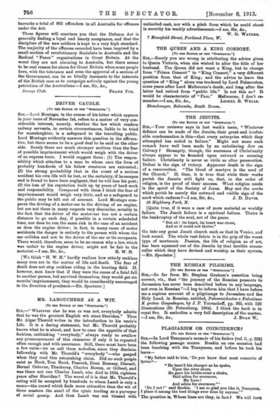DRIVER CAUDLE.
[To nu EDITOR OF THE "SPECTATOR."] SIR,-Lord Montagu, in the course of his letter which appears in your issue of November 1st, refers to a matter of very considerable interest, namely, whether the law which renders railway servants, in certain circumstances, liable to be tried for manslaughter, is a safeguard to the travelling public. Lord Montagu evidently answers this question in the affirmative, but there seems to be a good deal to be said on the other side. Surely there are much stronger motives than the fear of possible imprisonment which would weigh with the driver of an express train. I would suggest three : (1) The responsibility which attaches to a man to whose care the lives of probably hundreds of his fellow creatures are entrusted ; (2) the strong probability that in the event of a serious accident his own life will be lost, or the certainty, if he escapes and is found to have been negligent, that he will lose his post; (3) the loss of his reputation built up by years of hard work and responsibility. Compared with these I think the fear of imprisonment would weigh very little, and as a safeguard to the public may be left out of account. Lord Montagu compares the driving of a motor-car to the driving of an engine, but are not these in many respects very dissimilar, notably in the fact that the driver of the motor-car has not a certain distance to go each day, if possible in a certain scheduled time, nor does he run the same risk in the case of an accident as does the engine driver; in fact, in many cases of motor accidents the danger is entirely to the person with whom the car collides and not to the driver of the car or its occupants. There would, therefore, seem to be no reason why a law, which was unfair to the engine driver, might not be fair to the
motorist.—I am, Sir, &c., H. W. H. [We think "H. W. H." hardly realizes how utterly reckless many men are in the matter of life and death. The fear of death does not stop reckless riding in the hunting field. If, however, men knew that if they were the cause of a fatal fall to another person, but survived themselves, they would get six months' imprisonment, they would be considerably encouraged in the direction of prudence.—ED. Spectator.]


















































 Previous page
Previous page